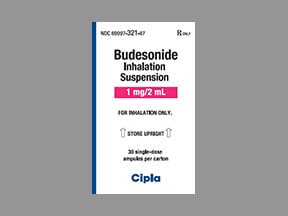
Budesonide Coupons & Savings Card – Discount Prices from $152.03
Generic for: Pulmicort, Pulmicort flexhaler, Uceris
My prescription
Edit
2ML of 1MG/2ML, Budesonide (30 Plas Conts)
Select pharmacy

CVS
$152.03
COUPON PRICE
Walgreens
$185.06
COUPON PRICE
Walmart
$222.21
COUPON PRICE
Albertsons
$260.76
COUPON PRICEBudesonide savings card
Show this card to your pharmacist
CVS
$152.03
BIN
ID
PCN
GRP
019876
LH8C4BA74D
CHIPPO
LHX
Powered by
More prescriptions for ulcerative colitis
More prescriptions for ulcerative colitis
Price history for Pulmicort (brand) & Budesonide (generic)
30 Plas Conts, 2ML
Average retail price for Pulmicort
Average retail price for Budesonide
Average SaveHealth price for Budesonide
Our price history data is based on aggregated prescription data collected from participating pharmacies in America. Our prescription data updates daily to reflect the latest price changes. If you notice a missing data point, it means there wasn't sufficient data available to generate a monetary value for that date.
We analyzed Budesonide prices for (2ML, 30 Plas Conts) over the last 12 months. The average retail price was $1294.40, while the average price using the SaveHealth discount card was $202.94. That's a savings of approximately 84.32% when using our Budesonide coupon.
Compared to the generic version, Pulmicort had an average price of $326.48 over the same time period. With the SaveHealth savings card, Budesonide is 37.84% cheaper on average than Pulmicort.
*Retail prices are based on pharmacy claims data, and may not be accurate when we don't have enough claims.
Budesonide dosage forms
Dosage Quantity Price from Per unit 2ML 30 Plas Conts $152.03 $5.07 2ML 60 Plas Conts $285.76 $4.76 2ML 90 Plas Conts $427.48 $4.75 2ML 120 Plas Conts $561.21 $4.68 2ML 180 Plas Conts $828.67 $4.60
| Dosage | Quantity | Price from | Per unit |
|---|---|---|---|
| 2ML | 30 Plas Conts | $152.03 | $5.07 |
| 2ML | 60 Plas Conts | $285.76 | $4.76 |
| 2ML | 90 Plas Conts | $427.48 | $4.75 |
| 2ML | 120 Plas Conts | $561.21 | $4.68 |
| 2ML | 180 Plas Conts | $828.67 | $4.60 |
